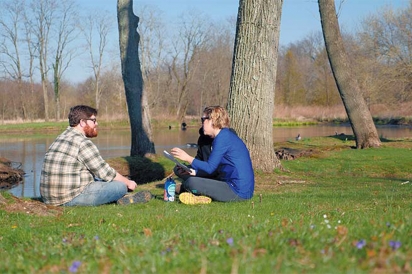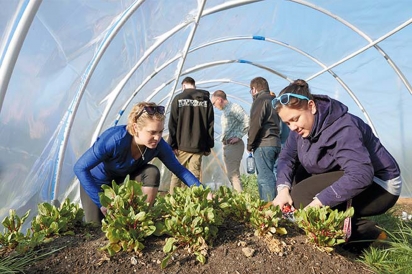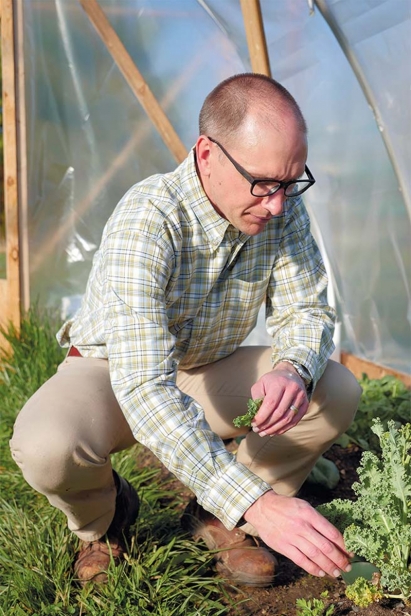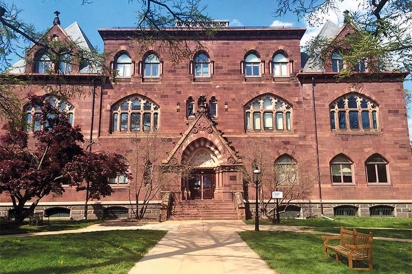Princeton Theological Seminary Explores Intersection of Faith and Food
Kneeling on Earth
Twizzlers seem an unlikely lens through which to contemplate the word of God. Yet one Princeton Theological Seminary student recently found that contrasting the electric-red licorice sticks with home-grown produce helped her test the limits of author Norman Wirzba’s pronouncement that, “To receive food as a gift and as a declaration of God’s love and joy is to receive food in the theological manner.”
“Is it the same thing to be thankful for a meal you grew yourself versus something that you got from a vending machine?” the student asked a group of fellow seminarians who were gathered in a farm garage that doubles as a makeshift classroom. Acknowledging that Twizzlers are among her favorite snacks, she asked, “Did God mean for us to eat the things we are eating?”
This type of inquiry is not unusual, or discouraged, at the Farminary—the Princeton Theological Seminary’s farm-based initiative that integrates theological education and sustainable agriculture with the goal of training leaders for the church who are conversant in the interplay of theology, ecology and faith.
The belief that sustainable agriculture can help form leaders, says Nate Stucky, director of the Farminary, grows out of the idea that good farmers and good pastors necessarily share many of the same skills and proficiencies. This includes, Stucky says, “knowing how to pay attention to the seasons, knowing how to tend to something, knowing how to persist through failure, and knowing—and having reverence for—the interconnectedness of life and death.” The Farminary program is also an acknowledgment that young adults, eager to participate in the transformation of the food system, are returning to the land in search of meaning and community. Stucky believes that, given its deep agrarian roots, the Christian faith tradition has much to contribute to young people’s conversations around food, agriculture and stewardship of the Earth.
Stucky describes the Farminary as “a way of doing theological education rooted in a particular place.” That place is the seminary’s 21-acre farm, located three miles from its downtown Princeton campus. Purchased in 2010 with vague intentions of creating a retreat center or an extra event space, the former sod farm is now undergoing a slow, deliberate transformation. In the spring of 2015, students in the first Farminary class prepared a 40-by-60-foot garden on the property by erecting fences and digging multiple beds by hand. They built compost piles and planted carrots, lettuces, onions, radishes and other crops, which they tended during their weekly classes; students in subsequent semesters continued the work. For now, that garden is the only actively cultivated area of the farm, but planning is underway to hire a part-time farm manager to expand the area under cultivation.
Farminary classes include a mix of traditional class time, work in the garden and a potluck meal. Three-credit courses, such as Scripture and Food: Teaching the Bible in Congregations—the class in which Twizzlers were discussed—meet at the farm for six hours each week. For the first hour, students break into small groups to discuss quotes from the weekly reading assignment, which includes selections from the Bible as well as the writings of theologians and farmers. Gardening fills the next hour and a half—often accompanied by mini-lessons and continued discussions of the texts. After an hour-long potluck meal, class is held in the barn for the final two and a half hours.
Gardening adds a level of complexity to class planning because the weekly tasks must allow for a range of skill levels while also moving the garden toward a successful harvest. And the gardening experience, Stucky says, should be useful in prompting reflection on their scripture studies. Working the soil, for example, may lead to a deeper, more nuanced understanding of the biblical story in which God takes a handful of soil and breathes into it—and life emerges. Or a gardening task may spark a revelation, as it did for one Old Testament professor who recognized that kneeling to plant seeds puts one in the posture of service to the land.
At present, two classes are being taught at the Farminary. Stucky and his curriculum development team are expanding class offerings by finding farming connections within existing seminary courses as well as by developing new courses. Eventually Farminary students who take a requisite number of credits and participate in a practicum will earn a certificate in Theology, Ecology and Faith Formation.
Katie O’Hern, a 2015 graduate of the seminary, sees tremendous value in getting outside the typical classroom setting. A member of the first Farminary class, she found that working side by side with the professor opened new lines of communication. “He knelt down next to us and we worked on the same thing together,” O’Hern says. The mutual experience of dirty knees and dirt under the fingernails helped her feel more at ease to ask questions she once worried might sound silly.
Working together with classmates who had widely varying levels of gardening experience required vulnerability and humility—removing some of the competitive culture often found in the classroom. And dining together meant getting to know each other in a way that isn’t possible in a weekly lecture hall.
O’Hern now applies the lessons of the Farminary in her work as Minister for Discipleship and Mission at Asbury First United Methodist Church in Rochester, New York. Her informal discussion groups meet in restaurants, where sharing a meal creates a relaxed atmosphere that encourages reticent members to join in.
She even uses the analogy of the garden to describe her work as a pastor. “My job is to bring a little water or to pull a few weeds. My job is not to create the growth, because I can’t,” O’Hern says. “My job is just to create the conditions in which that growth can happen.” Her Farminary experience also drove home the lesson that death is an essential part of life. “In our first class, Nate said something like ‘It doesn’t matter what food is on your plate, whether it is a chicken or a carrot, it died to be there. It died so that you might live,’” O’Hern recounts. “I cannot say how much that has transformed my understanding of so many things.”
That death and rebirth are made visible through agriculture makes the Farminary a powerful tool for demonstrating the necessity of rest and of accepting the cyclic nature of life. “The whole idea that things grow and die, and that new life comes from the fact that they die—there is a whole lot about consumer society that’s made to blunt that,” says Kenda Creasy Dean, professor of Youth, Church, and Culture at the seminary and a member of the Farminary steering committee. “There is something to be said for recognizing that we live within limits. There’s nothing like working within the seasons and the rhythm of life, that is so vivid in agriculture, to remind you of that. You can’t control when it rains, so you are not ultimately in control. You have seasons that involve suffering and sometimes death There is hope that comes on the other side of that, but death is not something you can avoid.”
Dean likes that the Farminary interrupts the pervasive drive in our culture toward high productivity and achievement. Noting that students who are accepted into the seminary often arrive with an impressive list of accomplishments, she values the lessons they can learn through the failures and mishaps that are inevitable in farming. “It sets them back a little,” Dean says. “It is an identity challenge, it is a theological challenge, and it is a practical challenge.”
Together with friends and colleagues, Stucky began exploring the idea of the Farminary during his time as a Princeton Theological Seminary student himself. While he was one of the driving forces behind starting the Farminary, Stucky emphasizes that it was also propelled by concerns around ecology, sustainability, climate and food justice among the seminary’s more than 500 students, who represent a range of Protestant denominations as well as the Roman Catholic and Eastern Orthodox churches.
“What I think the church is fi nally waking up to is that we are called to be in relationship not just with one another as humans but with everything that God has created,” says Jess Rigel, a second-year student who predicts that her work after graduation will include some elements of food and environmental justice. “We have to extend that relationship, not just to animals and plants, but to the soil—something that is alive and serves us. Until we can do that in a restorative, redemptive way, we are going to be in trouble.”
One of the key lessons that Rigel is learning through the Farminary is patience—a quality that she often calls upon as a member of the Farminary steering committee. “I’m annoying and I really want to push them to do crazy things that they’re not ready to do—like have yurts, and goats, and dry composting toilets,” she says with a laugh. “I want this to be an example—not only an example of a farm, but also in terms of sustainability. That takes time, so I have to be encouraged to be patient—a lot.”
Through the Farminary, Stucky hopes to send leaders out into the world who can demonstrate that there are resources within the Christian theological tradition that can inform our approach to ecological challenges in very real ways. He also feels a deep need to engage in a meaningful, respectful conversation with people who may have a different perspective, including conventional and factory farmers.
A native of Kansas, Stucky lived and worked on farms for most of his life before coming to the Princeton Theological Seminary, where he earned a Master of Divinity and a PhD. Having watched his father get squeezed out by the 1980s farm crisis, Stucky has enormous sympathy for farmers who survive economic and ecological disasters to succeed in industrial agriculture.
“Part of my story that gets wrapped up into the Farminary is a deep love for lots of people who are up to their armpits in industrial agriculture,” Stucky says. “And a deep love for people who are hook, line and sinker into organic and recognizing the need for more sustainable ways of living in this world.” He wonders how we can broaden the conversation about food and agriculture so that it doesn’t exclude people like his brother-in-law who farms 5,000 acres in Nebraska.
“It’s so complicated and so hard to have the conversation without accidentally vilifying people who are actually trying to be part of a solution,” adds Dean. “Every class discussion, of course, has people on all sides of this. There are fireworks every time.”
Rigel is eager to see the church get involved in bridging the divide between industrial and sustainable agriculture. “We have to figure out a way to invite industrial agriculture into this conversation in a way that is not off-putting,” Rigel says. “I think a really cool thing that the church can help do is to extend grace in these relationships. There are all these other voices here. We just have to find a way to make them heard.”
Princeton Theological Seminary
64 Mercer St., Princeton
609.921.8300
ptsem.edu
PRINCETON’S HISTORIC SEMINARY
Princeton Theological Seminary is the second-oldest
seminary in the United States, and the largest of ten
seminaries associated with the Presbyterian Church.
It was founded in 1812, and today enrolls about 500
students. Its vast theological library is the second largest
in the world. Only the Vatican’s is larger.










